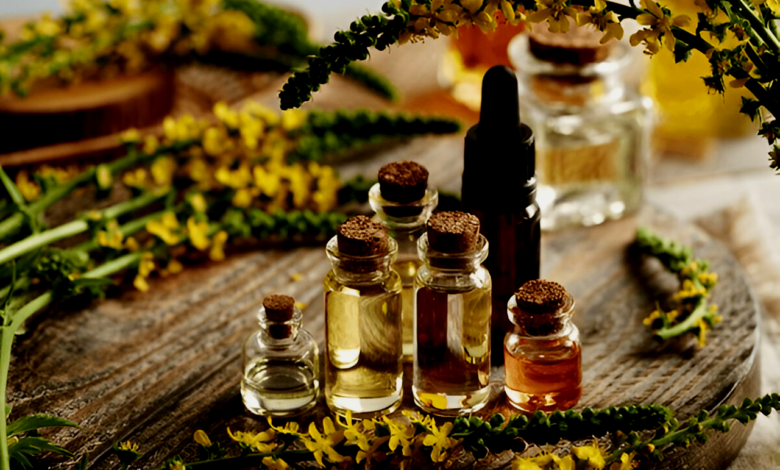How to Use Essential Oils for Common Ailments
Discover natural remedies with essential oils for stress, digestion, skin care, and more. Learn safe, effective uses for holistic wellness.

Essential oils have been used for centuries as natural remedies for a variety of common ailments. Extracted from plants, these concentrated oils capture the essence of their source, offering therapeutic benefits that can address physical, emotional, and mental health concerns. From relieving headaches to boosting immunity, essential oils provide a holistic approach to wellness. This article explores how to use oils effectively for common ailments, offering detailed guidance on their applications, benefits, and safety precautions.
In the following sections, we will delve into the science behind essential oils, their mechanisms of action, and specific ways to use them for ailments such as stress, digestive issues, respiratory problems, skin conditions, and more. Whether you are new to aromatherapy or a seasoned enthusiast, this comprehensive guide will equip you with the knowledge to harness the power of oils for improved health and well-being.
The Science Behind Essential Oils
Essential oils are volatile compounds extracted from plants through methods like steam distillation or cold pressing. These oils contain active ingredients that interact with the body in various ways. When inhaled, the aroma molecules travel through the olfactory system to the brain, influencing the limbic system, which regulates emotions and memory. When applied topically, oils penetrate the skin and enter the bloodstream, providing localized or systemic benefits.
The therapeutic properties of oils depend on their chemical composition. For example, lavender oil contains linalool and linalyl acetate, which are known for their calming and anti-inflammatory effects. Peppermint oil, rich in menthol, is celebrated for its ability to relieve pain and improve digestion. Understanding the unique properties of each oil is key to using them effectively for specific ailments.
Using Essential Oils for Stress and Anxiety
Stress and anxiety are among the most common reasons people turn to essential oils. Lavender oil is a popular choice for its calming effects. Diffusing a few drops of lavender oil in your home or workplace can create a relaxing atmosphere. Alternatively, you can mix it with a carrier oil like coconut or jojoba oil and apply it to your wrists, temples, or the back of your neck for quick relief.
Bergamot oil is another excellent option for reducing stress. Its citrusy aroma helps uplift the mood and alleviate feelings of anxiety. You can add a few drops to a warm bath or use it in a diffuser. For those experiencing chronic stress, blending oils like chamomile, ylang-ylang, and frankincense can provide a more comprehensive solution.
Essential Oils for Digestive Issues
Digestive problems such as bloating, indigestion, and nausea can be effectively managed with oils. Peppermint oil is a well-known remedy for digestive discomfort. Its antispasmodic properties help relax the muscles of the gastrointestinal tract, reducing bloating and cramping. To use, dilute a few drops of peppermint oil in a carrier oil and massage it onto your abdomen in a clockwise direction.
Ginger oil is another powerful option for digestive health. It stimulates digestion and relieves nausea, making it ideal for those suffering from motion sickness or morning sickness. You can inhale ginger oil directly from the bottle or add a drop to a glass of warm water (ensure the oil is safe for internal use). Fennel oil, with its carminative properties, is also beneficial for reducing gas and improving digestion.
Respiratory Relief with Essential Oils
Essential oils can provide significant relief for respiratory issues such as congestion, coughs, and sinusitis. Eucalyptus oil is a staple for respiratory health due to its decongestant and expectorant properties. Adding a few drops to a bowl of hot water and inhaling the steam can help clear nasal passages and ease breathing.
Tea tree oil, with its antimicrobial and anti-inflammatory properties, is another excellent choice for respiratory ailments. It can be diffused to purify the air or applied topically to the chest (diluted with a carrier oil) to relieve congestion. For a soothing blend, combine eucalyptus, peppermint, and lavender oils and use them in a diffuser or steam inhalation.
Skin Care and Essential Oils
Essential oils are widely used in skincare for their ability to address issues like acne, eczema, and dryness. Tea tree oil is a popular choice for acne-prone skin due to its antibacterial and anti-inflammatory properties. Dilute a few drops with a carrier oil and apply it directly to blemishes for targeted treatment.
Lavender oil is beneficial for soothing irritated skin and promoting healing. It can be added to lotions or creams or used in a compress for conditions like eczema or sunburn. Frankincense oil, known for its rejuvenating properties, is ideal for mature skin. It helps reduce the appearance of fine lines and wrinkles while improving skin elasticity.
Boosting Immunity with Essential Oils
Essential oils can play a vital role in supporting the immune system. Oregano oil is renowned for its antimicrobial properties, making it a powerful ally against infections. However, it should be used with caution and always diluted due to its potency.
Lemon oil, rich in vitamin C and antioxidants, helps detoxify the body and boost immunity. Adding a drop to your water (if safe for internal use) or diffusing it in your home can provide these benefits. Thieves oil, a blend of clove, lemon, cinnamon, eucalyptus, and rosemary oils, is another popular choice for immune support.
Safety Precautions When Using Essential Oils
While essential oils offer numerous benefits, it is crucial to use them safely. Always dilute essential oils with a carrier oil before applying them to the skin to avoid irritation or sensitization. Perform a patch test before using a new oil to ensure you do not have an allergic reaction.
Some essential oils are not safe for pregnant or nursing women, children, or pets. For example, oils like clary sage and rosemary should be avoided during pregnancy. Additionally, certain oils can be toxic if ingested, so always check the label and consult a healthcare professional before internal use.
Read More: Essential Oils for Health: Tips for Aromatherapy Bliss
Conclusion
Essential oils are a versatile and natural way to address common ailments, offering a holistic approach to health and wellness. From relieving stress and anxiety to supporting digestion, respiratory health, and immunity, these potent plant extracts provide a wide range of therapeutic benefits. By understanding the properties of each oil and using them safely, you can incorporate essential oils into your daily routine to enhance your overall well-being.
As with any natural remedy, it is essential to approach the use of essential oils with knowledge and caution. Always research the oils you plan to use, follow proper dilution guidelines, and consult a healthcare professional if you have any concerns. With the right practices, essential oils can become a valuable tool in your journey toward a healthier, more balanced life.
FAQs
Can essential oils be ingested?
Some essential oils are safe for internal use, but only if they are labeled as such and used in moderation. Always consult a healthcare professional before ingesting any essential oil.
How do I dilute essential oils?
Mix a few drops of essential oil with a carrier oil like coconut, jojoba, or almond oil. A common dilution ratio is 2-3 drops of essential oil per teaspoon of carrier oil.
Are essential oils safe for children?
Some oils are safe for children when properly diluted, but others should be avoided. Always research and consult a pediatrician before using essential oils on children.
Can essential oils help with sleep?
Yes, oils like lavender, chamomile, and cedarwood are known for their calming properties and can promote better sleep when diffused or applied topically.
How long do essential oils last?
Most essential oils have a shelf life of 1-3 years if stored in a cool, dark place. Citrus oils tend to have a shorter shelf life, while oils like sandalwood and patchouli can last longer.











